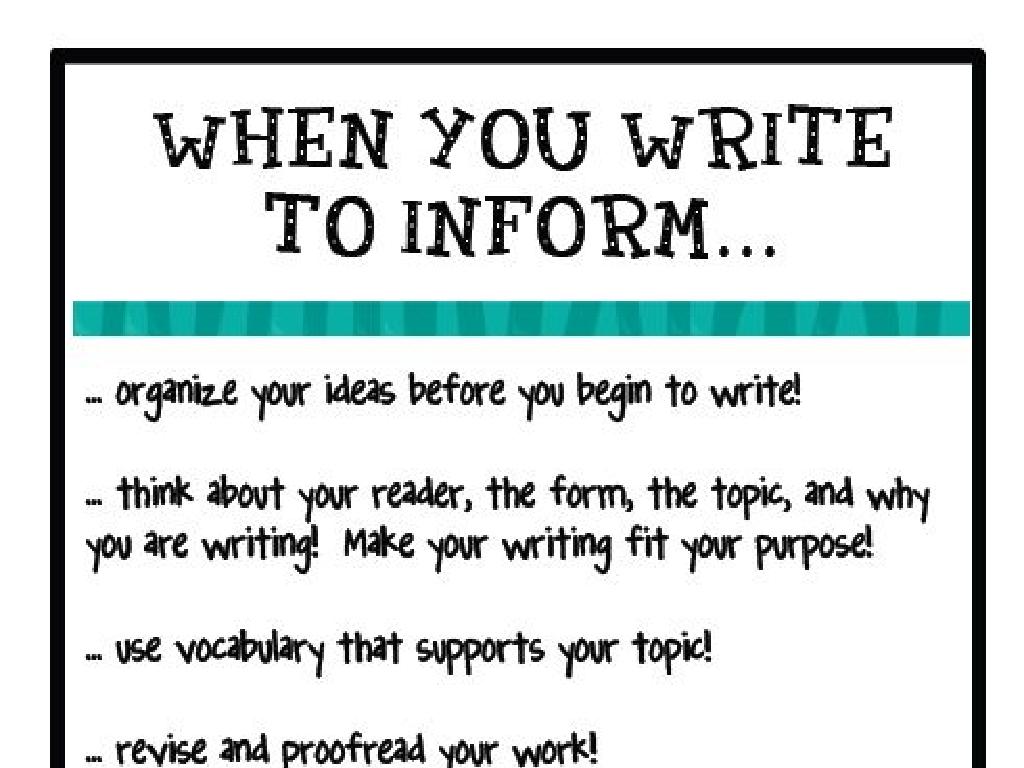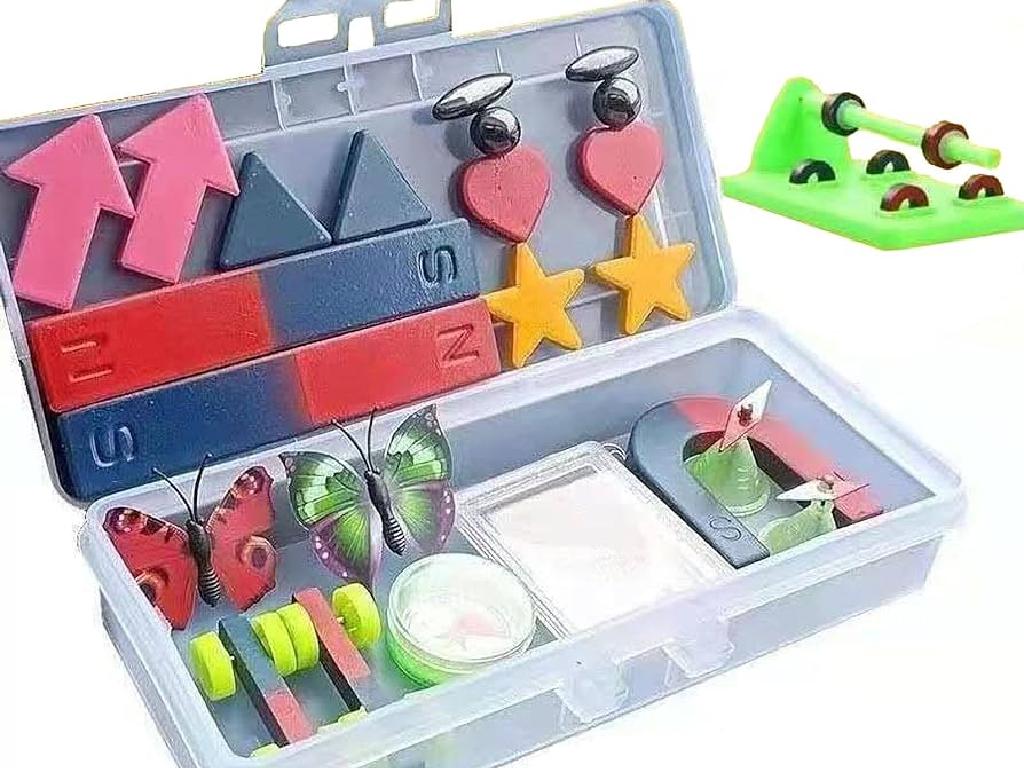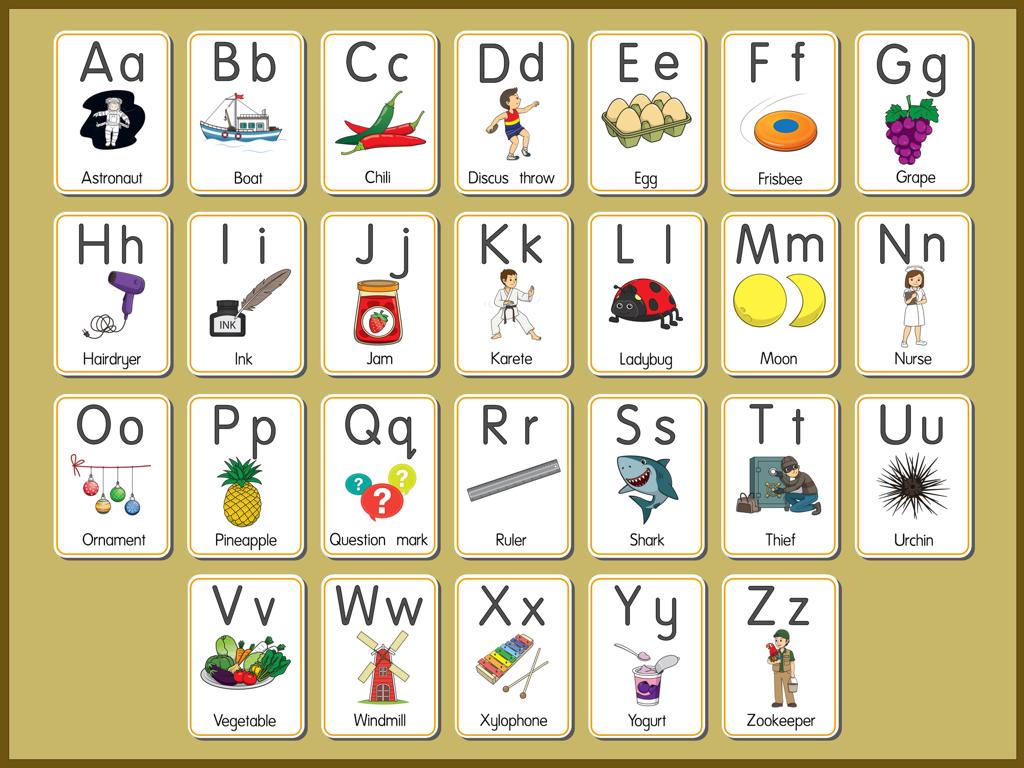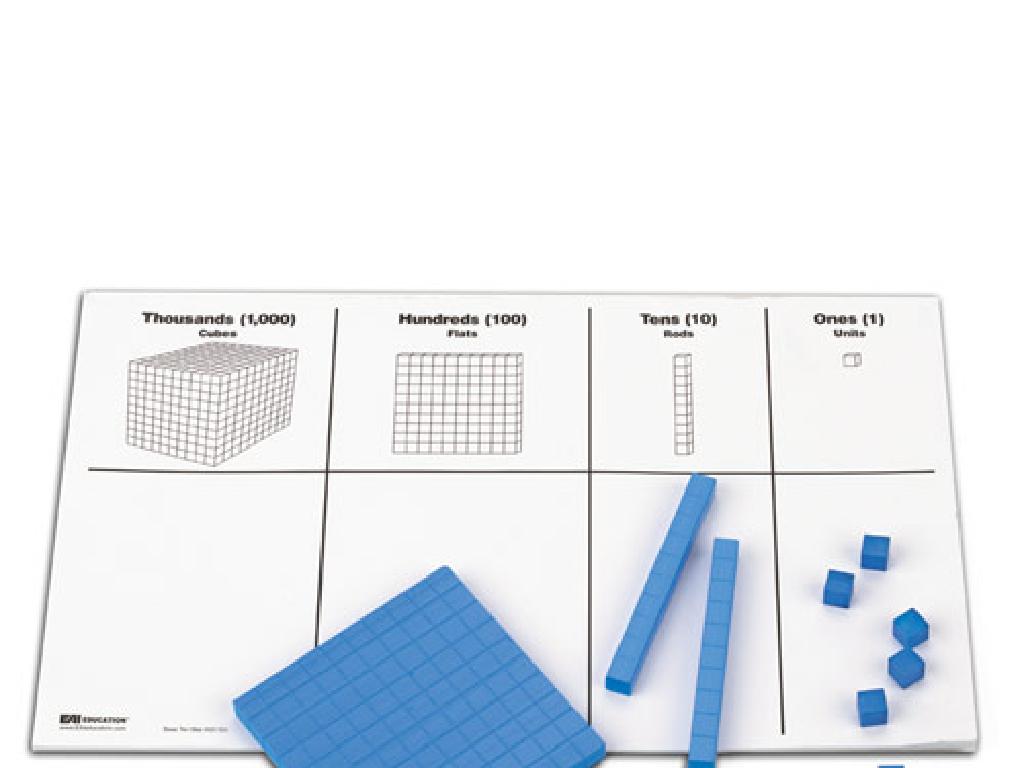Determine The Meaning Of Words Using Synonyms In Context
Subject: Language arts
Grade: Seventh grade
Topic: Context Clues
Please LOG IN to download the presentation. Access is available to registered users only.
View More Content
Understanding Synonyms in Context
– Define ‘Context Clues’
– Clues in the text that help deduce word meanings
– Today’s Objective: Using Synonyms
– Learn to find and use synonyms as clues
– Significance of Synonyms
– Synonyms provide insight into unfamiliar words
– Practice with Synonyms
|
This slide introduces the concept of context clues and focuses on how synonyms can aid in understanding the meaning of unfamiliar words. Context clues are hints found within a sentence or passage that can help decipher the meaning of new or tricky words. Emphasize the importance of synonyms as a type of context clue that can be particularly helpful because they are words with similar meanings, which can be used to infer the definition of the unknown word. Encourage students to practice this skill by identifying synonyms in example sentences and using them to understand new vocabulary. Provide several examples and exercises where students can apply this strategy.
Understanding Words Through Synonyms
– Define synonyms
– Words with same or similar meanings, e.g., ‘big’ and ‘large’.
– Examples of common synonyms
– ‘Happy’ and ‘joyful’, ‘sad’ and ‘unhappy’, ‘fast’ and ‘quick’.
– Synonyms in context
– Use synonyms to decipher unfamiliar words in a sentence.
– Enhancing vocabulary with synonyms
– Learning synonyms expands word choice in writing and speaking.
|
This slide introduces the concept of synonyms and their role in understanding the meaning of words within context. Synonyms are a key type of context clue that can help students deduce the meaning of unfamiliar words when reading. By recognizing synonyms, students can make educated guesses about the meanings of new words, which is a valuable skill for reading comprehension. Provide students with examples of synonyms and encourage them to think of additional pairs. Discuss how knowing synonyms can improve their writing by allowing them to choose more precise words to express their thoughts. Instruct students to practice identifying synonyms in their reading assignments and to use them in their writing.
Using Synonyms as Context Clues
– Authors use synonyms as clues
– Synonyms are words with similar meanings used to clarify terms
– Synonyms reveal meanings
– Find the synonym, understand the new word
– Practice with sentence examples
– We’ll explore examples to see how synonyms help in context
– Enhance vocabulary skills
|
This slide introduces the concept of using synonyms as context clues, a strategy that authors often employ to help readers infer the meaning of unfamiliar words. By identifying synonyms within the text, students can deduce the meaning of new vocabulary without needing a dictionary. This skill enhances reading comprehension and vocabulary acquisition. During the presentation, walk through several examples with the class, showing how to spot synonyms and use them to understand the context. Encourage students to practice this technique with various texts to become more proficient readers.
Synonyms in Action: Understanding Context
– Read a descriptive sentence
– Identify synonyms used
‘Tempestuous’ and ‘turbulent’ show similarity
– Determine the words’ meaning
Both imply a stormy, uncontrolled state
– Apply context to synonyms
Use context to infer that both words describe the sea’s roughness
|
This slide aims to teach students how to use context clues to determine the meaning of unfamiliar words by finding synonyms within the text. By examining the sentence about the sea, students can see how ‘tempestuous’ and ‘turbulent’ are used interchangeably to describe the chaotic nature of the sea, which helps them understand the meaning of both words. Encourage students to practice this skill by finding synonyms in other sentences and using context to infer meaning. This will enhance their vocabulary and reading comprehension skills.
Practice with Synonyms: Understanding Context
– Read a contextual sentence
– Identify a synonym in the sentence
‘Benevolent’ is similar in meaning to ‘generous’
– Determine the meaning of the synonym
Both words imply a kind and giving nature
– Relate synonym to the context
Understanding ‘benevolent’ by its context and synonym
|
This slide is aimed at practicing the use of synonyms to determine the meaning of words in context. Students will read a sentence and identify a word, in this case, ‘benevolent,’ and find its synonym, ‘generous.’ They will then use their understanding of the synonym to infer the meaning of the original word. This exercise helps students see how synonyms can provide context clues for understanding unfamiliar vocabulary. Encourage students to discuss why ‘benevolent’ and ‘generous’ are considered synonyms and how their meanings are related to the context of the sentence. This will enhance their vocabulary and comprehension skills.
Group Activity: Find the Synonyms
– Read sentences in groups
– Spot synonyms as context clues
– Synonyms give hints to the word’s meaning
– Discuss meanings of highlighted words
– Use discussion to agree on word meanings
– Write down your findings
|
This group activity is designed to enhance students’ understanding of how synonyms serve as context clues for determining the meaning of unfamiliar words. Divide the class into small groups and provide them with sentences that have certain words highlighted. Students will work together to identify synonyms within the sentence that give clues about the meaning of the highlighted word. After identifying the synonyms, they should discuss as a group to come to a consensus on the meaning of the word. Finally, they will write down their agreed-upon definitions. As a teacher, circulate around the room to facilitate discussions, provide guidance, and ensure that each group is on task. Possible activities for different groups could include sentences with varying difficulty levels or different sets of vocabulary words to ensure that all students are challenged appropriately.
Class Discussion: Synonyms in Context
– Share your word findings
– Discuss synonym clues
– How synonyms clarified word meanings
– Importance of synonyms
– Synonyms add depth to reading and comprehension
– Enhancing vocabulary skills
– Using synonyms to improve language and reading proficiency
|
This slide prompts a class discussion about the use of synonyms as context clues. Students will share the new words they found in their reading and explain how synonyms in the text helped them understand these words. Discuss why recognizing synonyms is crucial for reading comprehension and how this skill can enrich their vocabulary. Encourage students to think about how synonyms provide nuance and a deeper understanding of the text. This discussion will help students to actively engage with literature and improve their ability to infer meaning from context.
Practice Time: Synonyms and Context Clues
– Complete the synonyms worksheet
– Use strategies for new words
– Recall context clues techniques to infer meanings
– Be prepared to discuss answers
– Enhance vocabulary skills
– Applying these skills will help grow your understanding of language
|
This slide is designed for student engagement through individual practice. The worksheet provided will contain a series of sentences with underlined words that students must use context clues to decipher, specifically focusing on synonyms within the text. Encourage students to apply the strategies discussed in class, such as looking for nearby words with similar meanings, to determine the meaning of new vocabulary. After completing the worksheet, students should be ready to share and discuss their answers in the next class, fostering a collaborative learning environment. This activity aims to reinforce their ability to use context for understanding and to expand their vocabulary.
Review and Reflect: Synonyms in Context
– Understanding context clues
– Clues in the text that hint at a word’s meaning
– Using synonyms to define words
– Synonyms, words with similar meanings, can unveil unfamiliar words
– Importance of meaning in context
– Knowing word meanings enhances comprehension and communication
– Reflect on context clue usage
|
This slide aims to consolidate students’ understanding of context clues and their application in determining the meaning of unfamiliar words. Context clues are hints found within a text that can help deduce the meaning of new or tricky words. Synonyms, which are words with similar meanings, are a type of context clue that can be particularly useful. Understanding the meaning of words in context is crucial for reading comprehension and effective communication. Encourage students to reflect on how they’ve used context clues in the past and to share their experiences of how this strategy has aided their understanding of new vocabulary.
Class Activity: Synonym Search!
– Engage in ‘Synonym Search’ game
– Circle synonyms in the word search
– Find words that have similar meanings to others in the puzzle
– Collaborate on word meanings
– Discuss with peers to understand how synonyms give clues to word meanings
– Enhance vocabulary skills
|
This interactive class activity is designed to help students understand the concept of synonyms and how they can be used as context clues to determine the meaning of words. Provide each student or group with a word search puzzle that includes a list of words and their synonyms scattered throughout. As students find and circle the synonyms, encourage them to work in pairs or small groups to discuss the meanings of the words they find. This will not only help them to expand their vocabulary but also to understand the importance of context in determining word meaning. Possible variations of the activity could include creating sentences using the found synonyms, writing short paragraphs explaining the context in which the synonyms could be used, or even having a competition to see which group can find and correctly discuss the most synonyms.






